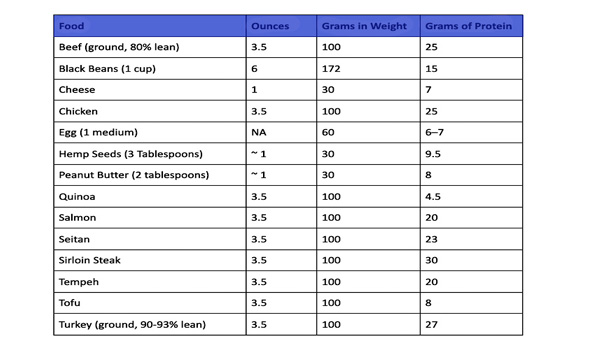What is Protein?
Protein is a macro nutrient that plays a vital role in the human body. It is made up of amino acids, which are the building blocks of proteins. Proteins are essential for growth and repair of body tissues, as well as for the production of hormones and enzymes. They also help to build and maintain muscle mass and strength, and play a role in immunity and cell signaling.
Proteins are found in many different foods, including meat, fish, eggs, dairy products, beans, lentils, nuts, and seeds. They can also be obtained through supplements such as whey or casein protein powders. It’s important to consume a variety of protein sources in order to get all the essential amino acids the body needs.
It’s important to note that consuming too much protein can also have negative effects on the body, such as kidney damage. Therefore, it’s important to consume the right amount of protein based on individual needs and consult a healthcare professional before making any significant changes to your diet.
Daily Protein Intake Calculator
[fcp-protein-intake-calculator]
A Daily protein intake calculator is a tool used to determine the amount of protein an individual should consume on a daily basis. This can be based on factors such as age, sex, weight, and activity level. The calculator typically uses a formula that takes into account the individual’s body weight and/or lean body mass, and multiplies it by a recommended protein intake per pound or kilogram.
It is important to note that protein needs can vary depending on an individual’s specific health and fitness goals. For example, athletes and bodybuilders may require more protein than sedentary individuals, and individuals trying to lose weight may require a different amount of protein than those trying to gain muscle mass.
It is also important to note that there is no one-size-fits-all recommendation for daily water intake calculator and it is always best to consult a healthcare professional before making any significant changes to your diet. Additionally, it is crucial to note that a balanced diet including a variety of food groups, not just protein, is important for overall health.
How to calculate daily protein intake ?
There are several ways to calculate your daily protein intake, including the following:
Using a protein calculator:
There are many online intake calculators that can help you determine your daily protein needs based on your age, sex, weight, and activity level.
Consulting a healthcare professional:
A doctor or registered dietitian can help you determine your specific protein needs based on your individual health and fitness goals.
Using a general guideline:
A general guideline for protein intake is to consume 0.8 grams of protein per kilogram of body weight per day. This means that a sedentary person should consume at least 0.8 g/kg/day and active person should consume 1.4-2g/kg/day.
Use a food diary and track your protein intake: Keep a food diary and track your protein intake for a few days to get an idea of how much protein you’re currently consuming. Then you can make adjustments as needed to reach your desired intake.
How to increase Protein Intake
There are several ways to increase protein intake, including:
- Eating more protein-rich foods such as meats, fish, eggs, dairy products, beans, and lentils
- Adding a protein supplement to your diet, such as whey or casein protein powder
- Incorporating high-protein snacks into your diet, such as nuts, seeds, and Greek yogurt
- Incorporating more plant-based protein sources, such as quinoa, tofu, and temper
- Eating more protein at each meal by adding a hard-boiled egg to your salad, topping your sandwich with turkey or chicken, or adding a scoop of protein powder to your smoothie.
It’s important to note that consuming too much protein can also have negative effects on your health, so it’s essential to monitor your intake and consult a healthcare professional if you have any concerns.
How do I calculate how much protein I need?
To calculate how much protein you need, you can use the following formula:
Protein needs (in grams) = body weight (in kilograms) x 0.8 (for sedentary adults)
or
Protein needs (in grams) = body weight (in kilograms) x 1.4-2.0 (for active adults)
For example, if you weigh 70 kilograms, your protein needs would be:
70 x 0.8 = 56 grams of protein per day (for sedentary adult)
70 x 1.4 = 98 grams of protein per day (for active adult)
Why daily protein is important for diet?
It’s important to note that this is a general guideline, and your specific protein needs may vary depending on factors such as age, sex, muscle mass, and activity level. It’s always best to consult a healthcare professional for personalized advice.
Additionally, it’s also important to note that consuming too much protein can have negative effects on your health, so it’s essential to monitor your intake and consult a healthcare professional if you have any concerns.
It’s worth noting that the daily protein intake needs may vary depending on factors such as age, sex, weight, muscle mass, and activity level, so it’s important to consult a healthcare professional to determine what’s best for you.
Ho to manage protein intake calculator for muscle gain
To calculate protein intake for muscle gain, you can use the following formula:
Protein needs (in grams) = body weight (in kilograms) x 1.6-2.2
This range is based on a moderate to high-intensity workout schedule, and it is considered as the optimal protein intake for muscle gain.
For example, if you weigh 70 kilograms, your protein needs would be:
70 x 1.6 = 112 grams of protein per day 70 x 2.2 = 154 grams of protein per day
It’s important to note that protein intake alone is not sufficient for muscle gain, and it should be combined with an adequate calorie intake and a strength training program. It’s also important to monitor your protein intake and consult a healthcare professional to make sure you are not consuming too much protein, which can have negative effects on your health.
It’s also worth noting that muscle gain will take time and consistency, and it’s important to be patient and stick to your workout and dietary plan.
Protein Intake For Women
The recommended protein intake for women can vary depending on factors such as age, weight, muscle mass, and activity level.
However, a general guideline for protein intake for adult women is to consume 0.8 grams of protein per kilogram of body weight per day.
For example, if a woman weighs 60 kilograms, her protein needs would be:
60 x 0.8 = 48 grams of protein per day
It’s also worth noting that for women who are pregnant or breastfeeding, the recommended protein intake is slightly higher at 1.1-1.5 grams of protein per kilogram of body weight per day.
It’s important to note that this is a general guideline, and your specific protein needs may vary depending on factors such as age, sex, muscle mass, and activity level. It’s always best to consult a healthcare professional for personalized advice. Additionally, it’s also important to note that consuming too much protein can have negative effects on your health, so it’s essential to monitor your intake and consult a healthcare professional if you have any concerns.
Protein Intake For Men
The recommended protein intake for men can vary depending on factors such as age, weight, muscle mass, and activity level.
However, a general guideline for protein intake for adult men is to consume 0.8 grams of protein per kilogram of body weight per day.
For example, if a man weighs 80 kilograms, his protein needs would be:
80 x 0.8 = 64 grams of protein per day
For men who are actively trying to build muscle, the recommended protein intake is slightly higher at 1.6-2.2 grams of protein per kilogram of body weight per day.
It’s important to note that this is a general guideline, and your specific protein needs may vary depending on factors such as age, sex, muscle mass, and activity level. It’s always best to consult a healthcare professional for personalized advice. Additionally, it’s also important to note that consuming too much protein can have negative effects on your health, so it’s essential to monitor your intake and consult a healthcare professional if you have any concerns.
How to track protein intake
There are several ways to track your protein intake, including:
- Keeping a food diary: Write down everything you eat and drink throughout the day, including the serving sizes and protein content of each food. You can use a paper diary or an app that tracks nutrition.
- Using a nutrition tracking app: There are many apps available for smartphones and tablets that allow you to track your protein intake and other nutrients. Some popular apps include MyFitnessPal, Cronometer, and LoseIt!
- Reading nutrition labels: Be sure to check the nutrition labels of packaged foods to see the amount of protein they contain.
- Consulting a dietitian or nutritionist: A dietitian or nutritionist can help you determine your protein needs and provide guidance on how to meet those needs through your diet.
- Using a food scale: Using a food scale to measure the serving size of your food can give you a more accurate picture of your protein intake.
It’s important to note that tracking your protein intake can help you ensure that you’re getting enough protein to support your health and fitness goals, but it’s also important to pay attention to the quality of the protein you’re consuming and to consult a healthcare professional if you have any concerns.
Benefits of Daily Intake Protein
There are many benefits of consuming an adequate amount of protein on a daily basis, including:
- Building and repairing muscle: Protein is essential for building and repairing muscle tissue, which is especially important for those who engage in regular strength training or other forms of exercise.
- Maintaining a healthy weight: Protein can help with weight management by increasing satiety, which can lead to a decrease in overall calorie intake.
- Improving bone health: Protein is important for maintaining strong bones, as it helps to build and repair bone tissue.
- Boosting immunity: Protein is important for the production of antibodies and other immune system cells, which help to protect the body against infection and disease.
- Supporting healthy skin, hair, and nails: Protein is an essential building block for the production of collagen, which helps to keep skin, hair, and nails healthy.
- Keeping blood sugar level balanced: Protein slows down digestion and keeps blood sugar level balanced.
- Improving cardiovascular health: Consuming an adequate amount of protein may help to lower blood pressure and improve cholesterol levels, which can help to reduce the risk of heart disease.
It’s important to note that consuming an adequate amount of protein is important for overall health, but it’s also important to pay attention to the quality of the protein you’re consuming
How many types of daily intake Protein
There are several types of protein that can be consumed on a daily basis, including:
- Animal-based proteins: These include meats, poultry, fish, eggs, and dairy products. Animal-based proteins are considered complete proteins because they contain all of the essential amino acids that the body needs.
- Plant-based proteins: These include legumes, nuts, seeds, and whole grains. Plant-based proteins are considered incomplete proteins because they may lack one or more of the essential amino acids that the body needs.
- Dairy proteins: These include milk, cheese, and yogurt. Dairy proteins are considered complete proteins because they contain all of the essential amino acids that the body needs.
- Egg proteins: Eggs are a very good source of protein. They are considered complete proteins because they contain all of the essential amino acids that the body needs.
- Soy proteins: Soybeans and soy products such as tofu, tempeh, and edamame are a good source of plant-based protein. Soy proteins are considered complete proteins because they contain all of the essential amino acids that the body needs.
- Pea Proteins: Pea protein is a plant-based protein that is derived from yellow peas. It is considered a complete protein because it contains all the essential amino acids that the body needs.
It’s worth noting that some people may have dietary restrictions or allergies, so it’s important to consult with a healthcare professional before making any significant changes to your diet. Additionally, it’s also important to make sure that you’re consuming a balanced and varied diet to ensure that you’re getting all the essential nutrients your body needs.




